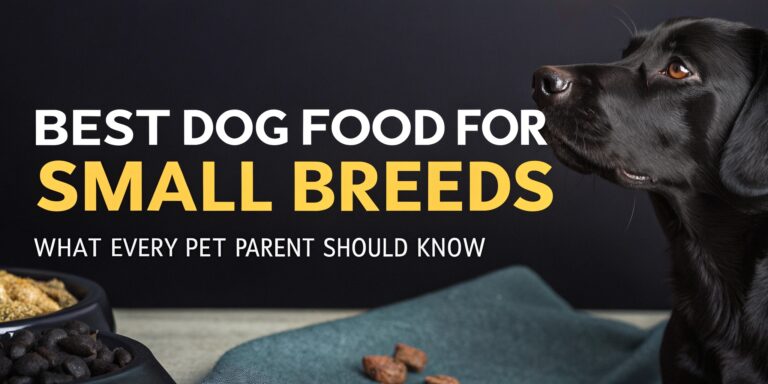Feeding your small dog the right food isn’t just about satisfying their appetite it’s about supporting their overall health, energy levels, and long-term wellness. If you’re a pet parent to a pint-sized pup, choosing the best dog food for small breeds can feel overwhelming. With so many options, ingredients, and marketing claims, how do you know what’s right?
Let’s break it all down so your little companion gets the nutrition they truly need.
Read this: Dog Anxiety Remedies: How to Calm Your Anxious Pup Naturally
Why Best Dog Food for Small Breeds Need Specialized Nutrition
Small Best Dog Food for Small Breeds have fast metabolisms, meaning they burn calories quickly. Unlike larger breeds, they often need calorie-dense food packed with essential nutrients in smaller portions. Their small stomachs can’t hold as much, so every bite must count.
Some key nutritional needs of Best Dog Food for Small Breeds include:
- High-quality protein to maintain lean muscles
- Healthy fats for energy and a shiny coat
- Small kibble size to make chewing easier
- Added vitamins and minerals for bone health and immunity
Top Ingredients to Look For
When choosing Best Dog Food for Small Breeds food, always read the ingredient list. Here’s what to look for:
- Named protein sources (like chicken, beef, or salmon) as the first ingredient
- Whole grains or vegetable-based carbs like brown rice or sweet potatoes
- Omega-3 fatty acids for skin and coat health
- Probiotics for better digestion
- No artificial colors, preservatives, or fillers
Small dogs are more likely to develop food sensitivities, so keeping their diet clean and simple can help avoid stomach troubles.
Read this: The Best Morning Routine for Your Dog: Start the Day Right
Wet vs. Dry Food: Which Is Better?
Both wet and dry foods have their pros and cons. For Best Dog Food for Small Breeds, many vets recommend high-quality dry kibble to help reduce tartar buildup and support dental health. However, wet Best Dog Food for Small Breeds can be a great option for picky eaters or older dogs with dental issues.
Some pet parents even choose to mix wet and dry food to combine benefits just be mindful of portion sizes to avoid overfeeding.
Common Mistakes to Avoid
Even with the Best Dog Food for Small Breeds intentions, some common mistakes can negatively affect your Best Dog Food for Small Breeds health:
- Overfeeding: Small dogs gain weight quickly. Always measure meals and avoid too many treats.
- Feeding large-breed food: Formulas for larger dogs may not meet the calorie and nutrient needs of your small pup.
- Ignoring life stages: Puppies, adults, and seniors all have different nutritional needs.
- Switching foods too fast: A sudden change can cause digestive upset. Always transition gradually over 7–10 days.
Top Vet-Recommended Dog Foods for Best Dog Food for Small Breeds
While your Best Dog Food for Small Breeds needs may vary, these brands consistently receive praise for their quality ingredients and nutritional balance:
- Wellness CORE Small Breed
- Blue Buffalo Life Protection Formula Small Breed
- Hill’s Science Diet Adult Small Paws
- Royal Canin Small Breed Adult
- Nutro Ultra Small Breed
Always consult your vet before making a switch, especially if your pup has allergies, sensitivities, or health conditions.
Read this: Top 10 Human Foods That Are Actually Safe for Dogs
Final Thoughts
Choosing the best dog food for small breeds is one of the most important decisions you’ll make as a pet parent. Pay attention to ingredients, portion sizes, and how your Best Dog Food for Small Breeds responds to their meals. With a little care and the right food, your tiny companion can thrive with energy, health, and happiness.



1 Comment
Pingback: How to Stop Excessive Barking in Dogs: Practical Tips for Pet Parents